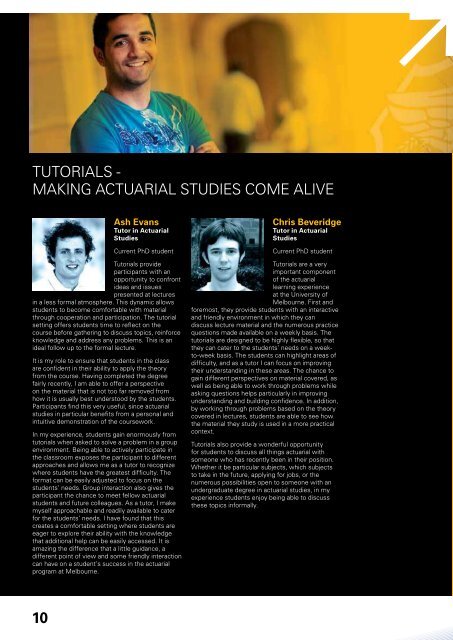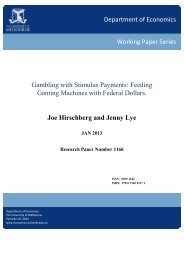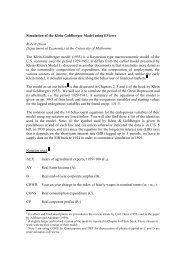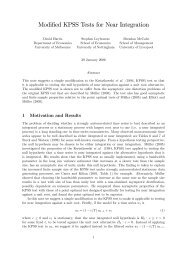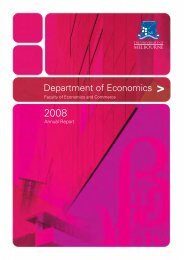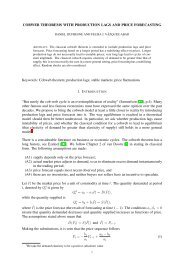Undergraduate Studies in Economics Undergraduate Studies in ...
Undergraduate Studies in Economics Undergraduate Studies in ...
Undergraduate Studies in Economics Undergraduate Studies in ...
Create successful ePaper yourself
Turn your PDF publications into a flip-book with our unique Google optimized e-Paper software.
tutorials -<br />
mak<strong>in</strong>g actuarial stuDies come alive<br />
Ash Evans<br />
Tutor <strong>in</strong> Actuarial<br />
<strong>Studies</strong><br />
Current PhD student<br />
Tutorials provide<br />
participants with an<br />
opportunity to confront<br />
ideas and issues<br />
presented at lectures<br />
<strong>in</strong> a less formal atmosphere. This dynamic allows<br />
students to become comfortable with material<br />
through cooperation and participation. The tutorial<br />
sett<strong>in</strong>g offers students time to reflect on the<br />
course before gather<strong>in</strong>g to discuss topics, re<strong>in</strong>force<br />
knowledge and address any problems. This is an<br />
ideal follow up to the formal lecture.<br />
It is my role to ensure that students <strong>in</strong> the class<br />
are confident <strong>in</strong> their ability to apply the theory<br />
from the course. Hav<strong>in</strong>g completed the degree<br />
fairly recently, I am able to offer a perspective<br />
on the material that is not too far removed from<br />
how it is usually best understood by the students.<br />
Participants f<strong>in</strong>d this very useful, s<strong>in</strong>ce actuarial<br />
studies <strong>in</strong> particular benefits from a personal and<br />
<strong>in</strong>tuitive demonstration of the coursework.<br />
In my experience, students ga<strong>in</strong> enormously from<br />
tutorials when asked to solve a problem <strong>in</strong> a group<br />
environment. Be<strong>in</strong>g able to actively participate <strong>in</strong><br />
the classroom exposes the participant to different<br />
approaches and allows me as a tutor to recognize<br />
where students have the greatest difficulty. The<br />
format can be easily adjusted to focus on the<br />
students’ needs. Group <strong>in</strong>teraction also gives the<br />
participant the chance to meet fellow actuarial<br />
students and future colleagues. As a tutor, I make<br />
myself approachable and readily available to cater<br />
for the students’ needs. I have found that this<br />
creates a comfortable sett<strong>in</strong>g where students are<br />
eager to explore their ability with the knowledge<br />
that additional help can be easily accessed. It is<br />
amaz<strong>in</strong>g the difference that a little guidance, a<br />
different po<strong>in</strong>t of view and some friendly <strong>in</strong>teraction<br />
can have on a student’s success <strong>in</strong> the actuarial<br />
program at Melbourne.<br />
Chris Beveridge<br />
Tutor <strong>in</strong> Actuarial<br />
<strong>Studies</strong><br />
Current PhD student<br />
Tutorials are a very<br />
important component<br />
of the actuarial<br />
learn<strong>in</strong>g experience<br />
at the University of<br />
Melbourne. First and<br />
foremost, they provide students with an <strong>in</strong>teractive<br />
and friendly environment <strong>in</strong> which they can<br />
discuss lecture material and the numerous practice<br />
questions made available on a weekly basis. The<br />
tutorials are designed to be highly flexible, so that<br />
they can cater to the students’ needs on a weekto-week<br />
basis. The students can highlight areas of<br />
difficulty, and as a tutor I can focus on improv<strong>in</strong>g<br />
their understand<strong>in</strong>g <strong>in</strong> these areas. The chance to<br />
ga<strong>in</strong> different perspectives on material covered, as<br />
well as be<strong>in</strong>g able to work through problems while<br />
ask<strong>in</strong>g questions helps particularly <strong>in</strong> improv<strong>in</strong>g<br />
understand<strong>in</strong>g and build<strong>in</strong>g confidence. In addition,<br />
by work<strong>in</strong>g through problems based on the theory<br />
covered <strong>in</strong> lectures, students are able to see how<br />
the material they study is used <strong>in</strong> a more practical<br />
context.<br />
Tutorials also provide a wonderful opportunity<br />
for students to discuss all th<strong>in</strong>gs actuarial with<br />
someone who has recently been <strong>in</strong> their position.<br />
Whether it be particular subjects, which subjects<br />
to take <strong>in</strong> the future, apply<strong>in</strong>g for jobs, or the<br />
numerous possibilities open to someone with an<br />
undergraduate degree <strong>in</strong> actuarial studies, <strong>in</strong> my<br />
experience students enjoy be<strong>in</strong>g able to discuss<br />
these topics <strong>in</strong>formally.<br />
the honours Program <strong>in</strong> actuarial stuDies<br />
Why do Honours<br />
<strong>in</strong> Actuarial <strong>Studies</strong>?<br />
An honours year provides an advanced knowledge<br />
of actuarial studies and the opportunity to develop<br />
your research and communication skills through<br />
either a research essay or a set of research<br />
projects.<br />
The Honours year also fulfils all the requirements<br />
for Associateship of the Institute of Actuaries of<br />
Australia. In this fourth year of study you will take<br />
advanced coursework <strong>in</strong> the areas of risk theory<br />
and f<strong>in</strong>ancial mathematics. Importantly you will also<br />
develop your bus<strong>in</strong>ess and academic writ<strong>in</strong>g skills<br />
and your communication skills by produc<strong>in</strong>g some<br />
research <strong>in</strong>to an area of actuarial science that has<br />
not been widely considered previously. Employers<br />
of actuarial graduates are becom<strong>in</strong>g <strong>in</strong>creas<strong>in</strong>gly<br />
<strong>in</strong>terested <strong>in</strong> students who can demonstrate an<br />
ability to learn, to adapt to chang<strong>in</strong>g situations and<br />
to work well with<strong>in</strong> a team. These skills are all<br />
honed dur<strong>in</strong>g the Honours year.<br />
Career advancement is more rapid for honours<br />
graduates. Initial salary rates for honours graduates<br />
are higher than those for ord<strong>in</strong>ary degree graduates<br />
and job tasks tend to be more varied, <strong>in</strong>terest<strong>in</strong>g<br />
and research orientated.<br />
Possession of a quality Honours degree assists <strong>in</strong><br />
obta<strong>in</strong><strong>in</strong>g scholarships and other forms of f<strong>in</strong>ancial<br />
support to undertake higher degrees.<br />
By study<strong>in</strong>g for Honours, you have the opportunity<br />
to obta<strong>in</strong> exemption from all subjects that comprise<br />
Part I of the Institute of Actuaries of Australia’s<br />
professional exam<strong>in</strong>ations. Additionally, Part II<br />
of the qualification as a Fellow of the Institute of<br />
Actuaries of Australia is covered <strong>in</strong> the honours<br />
year. It can be advantageous to study these<br />
subjects as a full time honours student, rather than<br />
attempt<strong>in</strong>g them on a part time basis while you<br />
are work<strong>in</strong>g.<br />
What are the Criteria<br />
for do<strong>in</strong>g an Honours Year?<br />
To be eligible for an honours year <strong>in</strong> Actuarial<br />
<strong>Studies</strong>, you must have satisfied the requirements<br />
for a Bachelor of Commerce degree, and have also<br />
completed the follow<strong>in</strong>g third-year subjects with<br />
a grade of at least H2B (70%) <strong>in</strong> four of these<br />
subjects.<br />
Y Actuarial Modell<strong>in</strong>g I<br />
Y Actuarial Modell<strong>in</strong>g II<br />
Y Cont<strong>in</strong>gencies<br />
Y Actuarial Statistics<br />
Y Models for Insurance and F<strong>in</strong>ance<br />
Y F<strong>in</strong>ancial Mathematics III<br />
Note that Cont<strong>in</strong>gencies counts as two subjects.<br />
Thus, a mark of 74 <strong>in</strong> Contigencies would count<br />
as two H2B grades.<br />
You should also note that meet<strong>in</strong>g these two<br />
requirements does not guarantee a place <strong>in</strong><br />
honours. For example, a student who completed<br />
eight third year actuarial subjects with four marks of<br />
70 and four marks of 50 meets the requirements,<br />
but would not be admitted. The Centre will only<br />
admit students who it believes can successfully<br />
complete the honours year.<br />
Application Process<br />
Applicants must apply on l<strong>in</strong>e at https://sis.unimelb.<br />
edu.au/cgi-b<strong>in</strong>/course-application.pl<br />
Selection takes place <strong>in</strong> December after third year<br />
results become available. You will be <strong>in</strong>formed <strong>in</strong><br />
early January to advise if your application has been<br />
accepted or not. You can then enrol as part of the<br />
normal enrolment process.<br />
10 11


